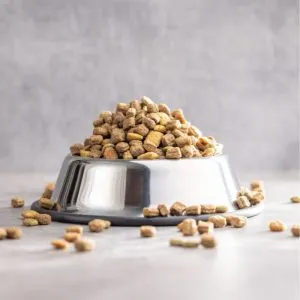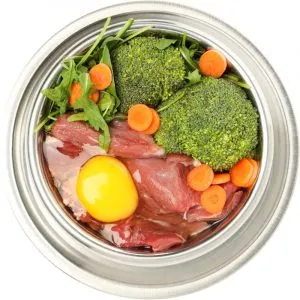As a dedicated Dachshund parent, you understand that these charming, long-bodied companions are more than just pets—they’re family. With their distinctive shape, lively spirit, and propensity for specific health considerations, choosing the Best Dog Food For Dachshunds is a critical decision that directly impacts their longevity and well-being. It’s not simply about filling their bowl; it’s about providing precise nutrition that caters to their unique needs at every stage of life.
In this in-depth guide, we’ll navigate the complexities of Dachshund nutrition, from understanding their breed-specific requirements to deciphering dog food labels and exploring the best options available. Our goal is to empower you with the knowledge to select a diet that keeps your beloved Dachshund vibrant, healthy, and happy for years to come.
Why Do Dachshunds Need Specialized Nutrition?
Dachshunds are a small breed, but their physical characteristics and active temperaments mean they have distinct dietary demands. Understanding these specific needs is the first step toward finding the ideal food.
Body Shape and Spinal Health
The Dachshund’s iconic long spine and short legs are adorable but also make them particularly susceptible to back issues, most notably Intervertebral Disc Disease (IVDD). Excess weight places immense pressure on their delicate spines, significantly increasing the risk of this painful condition. Therefore, the best food for Dachshunds should be formulated to help maintain a lean body condition and often includes ingredients like glucosamine and chondroitin to support joint and spinal health.
Active Lifestyle and Weight Management
Despite their small stature, Dachshunds are energetic and playful dogs, always ready for an adventure. However, their size combined with a love for treats can quickly lead to obesity and related health problems like diabetes. A high-quality diet for Dachshunds should offer a balanced protein content for muscle maintenance and moderate calories to prevent unwanted weight gain. Strict portion control is paramount to keeping them at a healthy weight.
Allergies and Sensitivities
Dachshunds are known to be prone to allergies, which can manifest as itchy skin, gastrointestinal upset, or recurrent ear infections. Opting for a quality Dachshund food with a limited, natural ingredient list can often help alleviate these common issues, promoting better skin, coat, and digestive health.
Decoding Dog Food Labels: What to Look For
Before you can choose the best dog food for Dachshunds, it’s essential to become proficient at reading and interpreting dog food labels. This skill will allow you to make informed decisions about your pet’s diet.
1. Check the Ingredients List
The ingredients are listed in descending order by weight. Prioritize foods where a high-quality protein source, such as chicken, beef, or fish, is the first ingredient. Avoid products that list fillers like corn, soy, or ambiguous “by-products” among the top ingredients, as these offer minimal nutritional value and can sometimes trigger sensitivities.
2. Look for Essential Nutrients
A balanced diet for Dachshunds requires an appropriate mix of protein, fats, and carbohydrates.
- Protein: Essential for muscle growth and repair. Aim for dry food with 18–25% protein for adult Dachshunds.
- Healthy Fats: Omega-3 and omega-6 fatty acids contribute to a shiny coat, healthy skin, and overall cellular function.
- Carbohydrates: Should come from wholesome sources like sweet potatoes, brown rice, or peas, providing sustained energy.
- Vitamins and Minerals: Ensure the food is fortified with crucial vitamins (A, E, B-complex) and minerals (calcium, phosphorus) for strong bones and overall vitality.
3. Avoid Artificial Additives
Artificial flavors, colors, and chemical preservatives can often provoke allergies or sensitivities in Dachshunds. Always opt for natural, high-quality dog food formulations to minimize the risk of adverse reactions.
4. Pay Attention to Life Stage
A Dachshund’s nutritional requirements change significantly throughout their life. Puppies, adults, and senior dogs have distinct needs, so always select food specifically designed for your dog’s current life stage to ensure optimal health.
Types of Dog Food for Dachshunds
With a better understanding of labels, let’s explore the various types of dog food available, each with its unique advantages and considerations for your Dachshund.
1. Dry Dog Food (Kibble)
Dry dog food remains the most popular choice for Dachshunds due to its convenience, affordability, and dental benefits. The crunchy texture of kibble can help reduce plaque and tartar buildup. When selecting kibble for your Dachshund:
- Look for small-sized pieces that are easy for their small mouths to chew and prevent choking hazards.
- Choose formulas specifically labeled as suitable for small breeds or “good dog food for Dachshunds,” as these are often designed with their unique needs in mind.
 A happy Dachshund sitting next to a bowl of dry kibble, illustrating a common choice for dog owners.
A happy Dachshund sitting next to a bowl of dry kibble, illustrating a common choice for dog owners.
2. Wet Dog Food
Wet food can be an excellent option for picky eaters or Dachshunds who need extra hydration. Its higher moisture content makes it highly palatable and often easier to digest. However, be mindful that wet food is often more calorie-dense, so precise portion control is crucial to prevent weight gain. Many owners find success by combining wet food with kibble to offer a balanced texture and comprehensive nutrition.
3. Grain-Free Dog Food
For Dachshunds with sensitive stomachs or diagnosed food allergies, grain-free options can provide significant relief. These formulations substitute traditional grains with alternative carbohydrate sources like vegetables and legumes. Always consult your veterinarian before transitioning to a grain-free diet to ensure it aligns with your Dachshund’s specific health profile.
4. Raw or Fresh Dog Food
Raw and freshly prepared diets have gained traction among pet owners who advocate for their nutritional benefits. These diets, whether homemade or from subscription services, emphasize high-quality, minimally processed ingredients. However, embarking on a raw or fresh diet requires meticulous planning to ensure it is nutritionally complete and balanced for your Dachshund.
 A Dachshund enjoying a meal of fresh, raw dog food, highlighting a popular dietary trend among pet owners.
A Dachshund enjoying a meal of fresh, raw dog food, highlighting a popular dietary trend among pet owners.
5. Specialty or Prescription Diets
In cases where Dachshunds face specific health challenges such as kidney disease, severe obesity, or diagnosed allergies, a veterinarian may recommend a prescription dog food. These diets are scientifically formulated to manage particular medical conditions. Always work closely with your vet to determine if a specialty diet is the right course of action for your furry friend.
Choosing the Best Food for Dachshund Puppies
Dachshund puppies are bundles of boundless energy undergoing rapid growth, and their nutritional needs are uniquely demanding. Selecting the appropriate puppy food is vital for their development.
Key Nutritional Needs for Puppies
- High Protein and Fat: Puppies require a significantly higher intake of protein and healthy fats compared to adult dogs. Protein is crucial for building strong muscles, while fats provide the necessary energy for growth and support vital functions like brain development. Look for puppy-specific formulas with at least 22–32% protein and a good source of omega-3 and omega-6 fatty acids, which are particularly important for brain and eye development.
- Smaller Kibble Size: With their tiny mouths and developing teeth, Dachshund puppies need small, easily manageable kibble. This ensures they can chew comfortably and safely, minimizing any choking hazards.
- Added DHA and EPA: Docosahexaenoic acid (DHA) and eicosapentaenoic acid (EPA), types of omega-3 fatty acids, are essential for cognitive and visual development in growing puppies. Foods enriched with fish oil or similar sources are excellent choices to support their rapidly developing brains and sharp vision.
Top Puppy Food Recommendations
When searching for the best dog food for Dachshunds in their puppy stage, consider brands known for their quality ingredients and breed-specific formulations:
- Purina Pro Plan Puppy Small Breed: This formula is tailored for small-breed puppies, featuring real chicken as the primary ingredient. It includes DHA from fish oil for brain and vision development and antioxidants for immune health. The small kibble size is ideal for Dachshund puppies.
- Wellness Complete Health Small Breed Puppy: Crafted with natural, high-quality ingredients, this food supports healthy growth. It contains deboned turkey and oatmeal for easy digestion, DHA for brain development, and a rich blend of vitamins and minerals.
- Royal Canin Dachshund Puppy: A top choice, this food is specifically formulated for the breed, supporting healthy joint and bone development—crucial for a breed prone to back issues like intervertebral disc disease (IVDD). Its kibble is tailored for their unique chewing style, and it includes antioxidants and prebiotics for immune and digestive health.
- Blue Buffalo Life Protection Puppy: This premium option features real meat as the first ingredient and is enriched with DHA and ARA (essential fatty acids similar to those found in mother’s milk) for brain and vision development. It’s free from by-product meals, corn, wheat, and soy, making it suitable for sensitive puppies.
- Hill’s Science Diet Puppy: Known for its highly digestible ingredients, this is an excellent choice for Dachshund puppies, especially those with sensitive stomachs. It includes high-quality chicken meal, barley, and DHA from fish oil to aid in brain and eye development, along with a balanced mix of vitamins, minerals, and antioxidants.
 A cute Dachshund puppy sitting attentively, symbolizing the importance of selecting the right food for young, growing dogs.
A cute Dachshund puppy sitting attentively, symbolizing the importance of selecting the right food for young, growing dogs.
Top Food Choices for Adult Dachshunds
For adult Dachshunds, the focus shifts to maintaining a healthy weight, providing sustained energy, and supporting their long-term health. Here are some of the best dog food for Dachshunds in their prime:
- Royal Canin Dachshund Adult: This breed-specific kibble is designed to support joint health, help maintain an ideal weight, and includes a precise blend of nutrients to promote muscle tone.
- Blue Buffalo Life Protection Formula Small Breed: Packed with high-quality protein and wholesome grains, this formula is excellent for active adult Dachshunds, supporting their energy levels and overall vitality.
- Wellness CORE RawRev Small Breed: This grain-free option combines nutrient-rich kibble with freeze-dried raw pieces, offering a powerful nutritional boost and enhanced palatability for adult Dachshunds.
Nutritional Needs and Best Foods for Senior Dachshunds
As Dachshunds enter their senior years (typically around 7-8 years old), their nutritional needs evolve to support aging joints, maintain lean muscle mass, and aid digestion. Here are some great options for senior Dachshunds:
- Hill’s Science Diet Adult 7+ Small Bites: A highly trusted choice for aging Dachshunds, this formula is easy to chew and includes antioxidants to support brain health and immunity.
- Nutro Ultra Small Breed Senior: This multi-protein, whole-grain formula is fortified with a blend of superfoods, making it an excellent choice for supporting the health and vitality of senior Dachshunds.
- Royal Canin Dachshund 8+: Specifically designed for senior Dachshunds, this kibble supports healthy aging, joint function, and helps maintain muscle mass as they mature.
Essential Tips for Selecting Your Dachshund’s Food
Beyond brand names and ingredient lists, several practical tips can help you make the most informed decision for your Dachshund’s diet.
1. Understand Your Dog’s Individual Needs
Every Dachshund is unique. Whether your dog is a puppy, adult, or senior, highly active or a couch potato, their food should perfectly match their current life stage, activity level, and any individual health considerations.
2. Look for Breed-Specific Formulas
Many premium brands recognize the distinct needs of breeds like Dachshunds and create specialized formulas. These often address key areas such as joint health, weight management, and kibble size, making them an excellent starting point for the best food for Dachshunds. Additionally, exploring options like best food for french bulldog can provide insights into nutrition for other small, active breeds with unique requirements.
3. Monitor Their Weight and Practice Portion Control
Dachshunds are particularly prone to weight gain, which can exacerbate spinal problems. Overfeeding, even slightly, can have serious consequences. Always adhere to the feeding guidelines on the dog food packaging and adjust portions based on your dog’s activity level and body condition. Regular weight checks are crucial.
4. Consult Your Veterinarian
Your veterinarian is an invaluable resource. They can provide personalized dietary advice based on your Dachshund’s specific health profile, age, activity level, and any pre-existing conditions. Always consult your vet before making significant changes to your dog’s diet, especially if they have health concerns or require a specialized diet.
Finding the Best Dog Food for Dachshunds
Choosing the right food is one of the most impactful decisions you’ll make for your Dachshund’s health and happiness. By understanding their unique dietary requirements, diligently reading food labels, and selecting high-quality products tailored to their life stage, you are laying the foundation for a vibrant and healthy life. Whether you opt for dry kibble, wet food, or a specialized diet, continuously monitor your Dachshund’s weight, energy levels, and overall health. After all, a thriving, joyful pup begins with the best dog food for Dachshunds!
